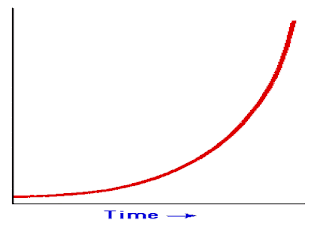My husband, Jagdish, and I are intrigued
by the concept of singularity. Technological capabilities have been increasing
exponentially over many decades. If you graph this, you get a swoosh that
eventually goes up to vertical infinity (my term). In his 2001 essay, The Law of Accelerating Returns, Ray
Kurzweil tells us: “Computer speed… doubled every three years between 1910 and
1950, doubled every two years between 1950 and 1966, and is now doubling every
year.”
I can see your eyes glazing over,
so let me cut to the chase. When the singularity arrives, AI (artificial
intelligence)—e.g. computers and robots—will be able to build versions of
themselves that are even smarter than they are, and by extension, smarter than
we are. That means we won’t be able to understand them, much less control them.
Scary stuff.
In other technological news,
computers have been hooked up to Etch-A-Sketches to design things and recent
medical developments include using 3-D printers making custom knee replacement
parts. My sister had one of these put in last week. My mind is whirling with
the possibilities of what will happen when AI that has outpaced us in
intelligence gets hold of an Etch-A-Sketch and hooks that up to a 3-D printer.
Computer programmers will be
familiar with the acronym GIGO—Garbage In, Garbage Out. It means that what you
get out of a computer is only as good as what the programmer and the data entry
clerk have fed into it. It stands to reason that the end products of the
singularity triad I envision will reflect the interests of the people who have
set them in motion. Here’s what I expect mine to do for me.
Colleagues from my Colgate
Palmolive days will expect that the first thing I’ll get out of my singularity
threesome is a closet full of shoes. They called me Imelda Decker back then,
and though I don’t need business shoes now that I’m retired, I still have a
closet fool of footwear. I counted twenty pairs just of black dress shoes in
there.
I’d also like to have a posse of cats
of every breed and color combination. They must be bred to be free of disease
and genetic glitches, so they’ll live a very long time. They should also be trained
to change the litter box themselves. And of course, they must be able to purr
in harmony. We wouldn’t want a cacophony in the household.
Now that I’m hooked on playing the
saxophone again, it would be convenient to have my own jazz group. My AI trio
will create instruments that play themselves, so I won’t have to worry about
coordinating folks’ schedules. Of course, I’ll always welcome real people to
join in; the social side of this is important to me, too. But if the trombone
player is sick, we’ll always have a backup.
The singularity should be able to
deliver an herb garden with plants that are able to water themselves and that
are resistant to bugs. We’ll have fresh thyme and rosemary and basil all year
long. I might even learn how to make my own pesto.
Of course, no plans for an
intelligent future would be complete for me without a wine cellar. My bot
beings would even figure out how to age the wine instantaneously. Free wine of
every variety. What a concept! While I’m at it, let’s get bottles that know how
to remove their corks by themselves. I’ve tried all kinds of openers and I’m
still searching for the perfect corkscrew. The one I liked best finally gave up
about six months ago.
The last futuristic development I
envision, at least for now, is books of mine that write and publish themselves.
There will be an entire wing of the Library of Congress filled with nothing but
Pulitzer Prize winning volumes written by me. Or more accurately, by my AI. Using
the GIGO concept, if my artificial intelligence writes well, it’s because I
programmed it to do that years earlier. I’ll deserve all those writing awards
and the royalties that will roll in as a result of them. I hope my singularity
comes soon!
For all you know, this blog was
written by artificial intelligence already. And it was probably buzzed on a
bottle of AI-produced vino…

No comments:
Post a Comment